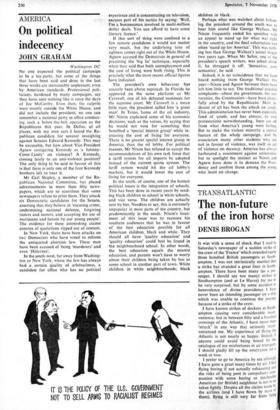AMERICA
On political indecency
JOHN GRAHAM
Washington DC No one expected the political campaign to be a tea-party, but some of the things that have been said and done in the last three weeks are inexcusably unpleasant, even by American standards. Professional poli- ticians, hardened by many campaigns, say they have seen nothing like it since the days of Joe McCarthy. Even then, the culprits were mostly outside the White House, and did not include the president; no one can remember a national party in office conduct- ing such a below-the-belt operation as the Republicans this year. In Dallas, of all places, with my own ears I heard the Re- publican candidate for senator inveighing against Senator Edward Kennedy. This may be excusable, but how about Vice-President Agnew castigating Kennedy as 'a Johnny- Come-Lately' on violence? A Kennedy, coming lately to an anti-violence position? The only thing to be said in favour of this is that there is only one of the four Kennedy brothers left to hear it.
Mr Sari Shipley, a member of the Re- publican National Committee, has placed advertisements in more than fifty news- papers, which are so scurrilous that some newspapers refuse to print them. They attack six Democratic candidates for the Senate, asserting that they believe in 'excusing crime, undermining national defence, forgiving rioters and looters, and accepting the use of marijuana and heroin by our young people'. The evidence for these astonishing claims consists of quotations ripped out of context.
In New York, there have been attacks on two Democrats who have voted to reform the antiquated abortion law. These men have been accused of being 'murderers' and even 'Hitlerites'.
In the south-west, far away from Washing- ton or New York, where the law has always had a certain quality of arbitrariness, a candidate for office who has no political
experience and is concentrating on television, excuses part of his tactics by saying: 'Well, I'm a businessman involved in multi-million dollar deals. You can afford to have some literary licence.'
If this sort of thing were confined to a few remote candidates it would not matter very much, but the underlying tone of ugliness comes right out of the White House. Agnew accused the Democrats in general of practising the 'big lie' technique, especially when they said that both unemployment and the cost of living were both rising. This is precisely what the most recent official figures have indicated.
The president's own behaviour has scarcely been above reproach. In Florida he appeared on the same platform as Mr Carswell, one of his defeated nominees for the supreme court. Mr Carswell is a mean little man; the president called him 'a great man'. In Texas, home of the oil industry, Mr Nixon explained some of his economic decisions, such as the vetoes, by saying that he would not vote for something that benefited a 'special interest group' while in- creasing the cost of living for everyone. There is no greater special interest group in America than the oil lobby. For political reasons, Mr Nixon has refused to accept the recommendations of his own task force that a tariff system for oil imports be adopted instead of the current quota system. The tariff system would hit the oil lobby's markets, but it would lower the cost of living for everyone.
In the south, of course, one of the hottest political issues is the integration of schools. This has been done in recent years by send- ing black children to school in white schools, and vice versa. The children are actually sent by bus. Needless to say, this is extremely unpopular in most parts of the country, but predominantly in the south. Nixon's treat- ment of this issue was to reassure his southern audiences that he was in favour of the best education possible for all American children, black and white. They should all have 'quality education' and 'quality education' could best be found in the neighbourhood school. In other words, the best education equals the nearest education, and parents won't have to worry about their children being taken by bus to some school in another part of town. White children in white neighbourhoods; black IT IS THE POLICY OF THE U.S. GOVERNMENT NOT TO SELL ARMS TO RACIALIST BEG-IMES children in black.
Perhaps what was weirdest about follow- ing the president around the south was to hear him sound like George Wallace. Mr Nixon frequently ended his speeches with an appeal to stand up for what was right in the country, and the final exhortation was often 'stand up for America'. This was noth- ing less than George Wallace's actual slogan two years ago. When Mr Safire, one of the president's speech writers, was asked about it, he shrugged it off: 'Semantics, pure semantics', he said.
Indeed, it is no coincidence that we have heard nothing from George Wallace this year—Nixon and Agnew between them have left him little to say. The traditional populist complaints—about the government, the uni- versities, the Communists—have been plenti- fully aired by the Republicans. Most in- decent of all has been the attack on youth. This administration has never been especially fond of youth, and has always, its own protestations notwithstanding, been cut off from what America's young were feeling. But to make the violent minority a central feature of the whole campaign, and by association many other students who are not in favour of violence, was itself an act of violence on decency. America has always harboured a resentment against universities but to spotlight the instinct as Nixon and Agnew have done is to demean the Presi- dency and confirm those among the young who insist on change.






















































 Previous page
Previous page